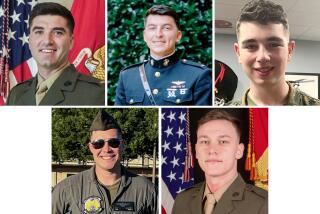Marine Gives Students Valuable History Lesson : Pen pal: Gary Price thanks his young friends who wrote to him in the Persian Gulf. For their efforts, they receive a firsthand view of the Middle East war.
IRVINE â Yellow ribbons outside Los Naranjos Elementary school on Friday carried a special meaning.
Marine Lt. Col. Gary Price, only two days back from the Middle East, came to the school to thank fifth- and sixth-grade pupils there who kept in touch with him while he was overseas.
âIâm very happy to be home, and I got your letters,â he told the combined classes. âI appreciated your letters and your concern--even your corny jokes.â
The pupils, including Priceâs 12-year-old son, Jeffrey, broke into smiles.
Writing letters to troops overseas has been a big thing with Los Naranjos pupils in recent months. And Principal Bruce Baron said the activity was very appropriate.
âAbout 45% of our students here are sons and daughters of military personnel over at the Tustin Marine base,â Baron said. âAll of our classes were involved in writing letters to dads who were deployed overseas.â
Price was part of a group of helicopter pilots from the Tustin air base who were shipped to Saudi Arabia in August, immediately after Iraq invaded Kuwait. Classmates of Jeffrey Price wrote him dozens of letters while he was overseas.
âIâm just sorry I didnât have the chance to write back,â Price said. âBut I want to come and personally thank you.â
Price, 42, was dressed in desert-camouflage fatigues. He said he was still groggy from jet lag and time changes from his flight back to California on Wednesday. But he was nonetheless glad to come to his sonâs school, to meet the students and to tell them about his war experiences.
Fifth- and sixth-grades teacher Penny Knox welcomed Price into the classroom with a hug. In the back of the room, beaming with obvious pride, sat the Marineâs mother, Dorothy Price, who had journeyed from Northern California. âIâve been praying every day for his safe return,â she said.
The classroom event was part show-and-tell and part history lesson. For many days the students had watched scenes of Operation Desert Storm on their TVs at home. Now, standing before them was a Marine helicopter pilot who had taken part in those historic actions.
âI canât tell you exactly where we were in Saudi Arabia, but we were miles and miles away from nowhere,â Price said. âWe lived in tents. Flies were everywhere. Camels also were everywhere, and there also were a lot of long-haired goats. . . .
âWe had to be very careful about scorpions. I always shook my shoes out in the morning to make sure a scorpion wasnât in there. And we had to watch out for poisonous snakes.â
Price showed the class a model of the CH-46 helicopter he flies. He said the fine, blowing sands of Saudi Arabia constantly damaged the chopperâs rotor blades and engines. âThe dust particles always were eating up our engines,â he said.
Price said his unitâs mission was to evacuate the wounded. âFortunately not many of our people got hurt (in the war), and thatâs good,â he noted. But he said the helicopter unit he commands had much action after the ground war broke out in February. âWe helped fly back many wounded Iraqi soldiers,â Price said.
During the liberation of Kuwait city, Price flew his aircraft into bomb-scarred Kuwait International Airport. âWe were the first transport helicopter to land there (during the liberation),â he said.
Departing Iraqi troops set Kuwaitâs vast oil fields ablaze, and in doing so, they severely damaged the country they had occupied, Price told the class. Even Kuwaitâs climate has felt the impact, he added.
âThe sky one day was so black with smoke that it was like night,â he said. âThe black smoke is even changing the weather there. Itâs now March, and people there tell me it usually is getting warm at this time of year, but itâs still cold there now. The temperatures are running 10 degrees cooler than usual.â
During a question-and-answer session, pupils mainly asked Price about how the Marines coped with desert living. He responded that food, for one thing, became pretty monotonous. âWe just ate a lot of MREs (meals-ready-to-eat),â he said. And he produced some military MREs to show students what the typical food looked like.
Holding up a white square that looked like a dry sponge, Price said, âHere you have a serving of pears.â Pupils made faces just thinking of eating the stuff.
More to Read
Sign up for Essential California
The most important California stories and recommendations in your inbox every morning.
You may occasionally receive promotional content from the Los Angeles Times.










